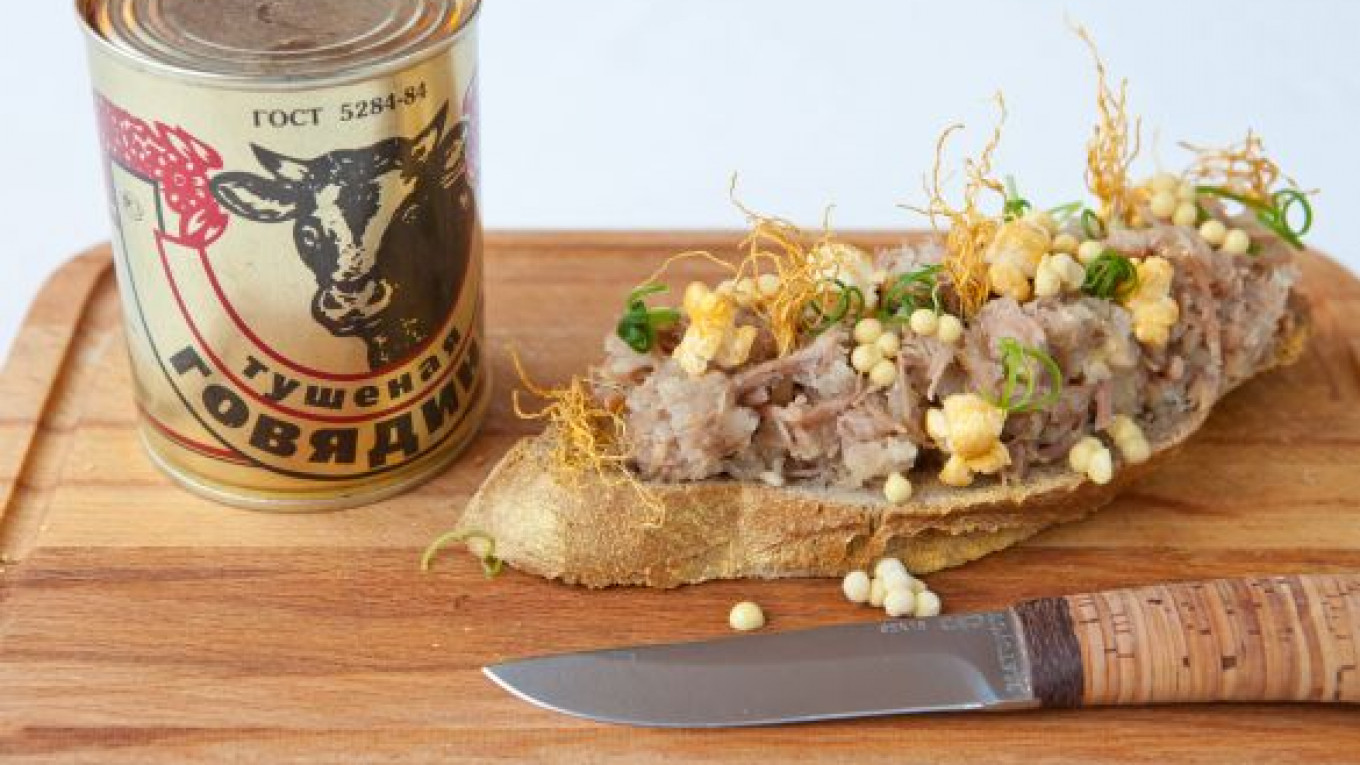Opening a can of pungent preserved meat may bring back less than fond memories from childhood for some, but for one Moscow restaurant it is the basis for a new menu. Cafe Mechta chef Dmitry Shurshakov, with the help of cocktail designer Alexander Kan, has produced a limited-edition series of dishes, which looks back to the days when much of the population lived out of a tin.
The menu, which chef Dmitry Shurshakov ambitiously calls "food art," has a selection of light meals, desserts and cocktails all created from tin-canned foods. "We wanted to experiment with Soviet cooking and make it contemporary," Shurshakov said in an interview over a meal at the restaurant. "The idea is that our customers try the dishes and their taste buds suddenly take them back in time to their childhood. We wanted to prove that the now-unpopular Soviet ingredients can be tasty and modern."
With imports strictly limited, intermittent food rationing and long winters reducing access to fresh food products, canned foods played a major role in the Soviet diet. Classic Soviet preserved goods include sgushchyonka or ever-so-sweet condensed milk, tushyonka, various kinds of preserved meat and cod livers, but it was the humble sprat that inspired Shurshakov.
Sprats, a popular dish even today, remains the most famous canned fish from Latvia. Shurshakov's mother often gave him sprats as a child, and it was a sampling of sprats on a sandwich of black bread with eggplant that eventually led to the limited-edition preserved food menu.
Together with cocktail mixologist, Alexander Kan, they began to experiment with preserved ingredients, making their own canned products and creating recipes from new tinned goods only now available in Russia, as well as from the old Soviet classics.
"We created many of the preserved foods from scratch ourselves, they are homemade and natural," Shurshakov said, "The preserves can be made in a very short time. You can make dishes from them in less than five minutes and, of course, they all last for a very long time."
Nevertheless, not all will be convinced. Of the seven salty preserve snacks available, costing between 290 and 350 rubles each (from $10 to $12), only a few are worth opening a tin for.
Shurshakov's favorite is made from a can of seaweed, one of the cheapest preserved goods in Soviet times. Combined with a spicy sauce it produces a tasty salad. A tin of gorbusha, a type of salmon, is used to make a soup. It is made in front of the diner with the use of a French press to separate the stock from the fish.
The best dish on the menu is based on Deko, a Belgian tinned-ham product, which combined with capers, egg and served on toast, was the only meal that makes you want to lick the plate clean.
"People would assume preserved goods aren't healthy, but just like anything you shouldn't eat them every day. People often drink beer, right? They are far healthier than beer," Shurshakov said.
The list of cocktails — a Bloody Mary that uses preserved tomatoes and a citrus based cocktail with puree from preserved lychees — are all very good and luckily lacking in any meat or fish products, but the desserts are a different matter, standing alone despite their preserved origins. Try potato cakes in a chocolate-rum sauce or the homemade ice cream made from condensed milk with a dash of vinegar on the side.
"It has been more successful than we ever imagined," Shurshakov said, "We wanted to challenge ourselves to make art from something unexpected while surprising our clientele."
The menu is available for another two weeks, but the sprat dish will remain permanently on offer at Mechta as will cod liver with apple puree, which is supposedly similar to ice cream at sister restaurant Chaika.
The menu runs until the Feb. 20. Cafe Mechta, 84 Sadovnicheskaya Ulitsa. Metro Paveletskaya. Tel. 633-5888. .
A Message from The Moscow Times:
Dear readers,
We are facing unprecedented challenges. Russia's Prosecutor General's Office has designated The Moscow Times as an "undesirable" organization, criminalizing our work and putting our staff at risk of prosecution. This follows our earlier unjust labeling as a "foreign agent."
These actions are direct attempts to silence independent journalism in Russia. The authorities claim our work "discredits the decisions of the Russian leadership." We see things differently: we strive to provide accurate, unbiased reporting on Russia.
We, the journalists of The Moscow Times, refuse to be silenced. But to continue our work, we need your help.
Your support, no matter how small, makes a world of difference. If you can, please support us monthly starting from just $2. It's quick to set up, and every contribution makes a significant impact.
By supporting The Moscow Times, you're defending open, independent journalism in the face of repression. Thank you for standing with us.
Remind me later.






